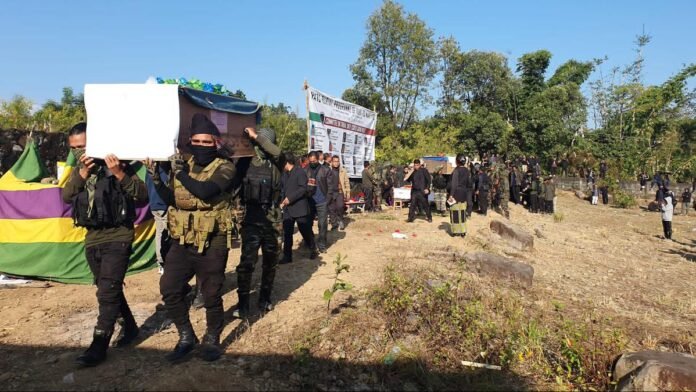Amid tight security measures, the bodies of 87 Kuki-Zo people were laid to rest in Churachandpur, marking a somber yet significant moment for the community. The elaborate funeral ceremony, conducted with reverence and in accordance with cultural traditions, aimed to provide a dignified farewell to the departed souls.
The deceased individuals were victims of a tragic incident, and their bodies had been kept in a temporary morgue as the community worked towards arranging a fitting final resting place. The funeral proceedings, attended by grieving family members, community leaders, and well-wishers, unfolded under the watchful eye of heightened security personnel to ensure a peaceful and respectful ceremony.
The meticulous planning of the funeral reflected the community’s determination to honor the memory of the departed and provide solace to grieving families. The rituals, guided by cultural practices, sought to pay homage to the lives lost and offer a sense of closure to the bereaved.
Security personnel, deployed in substantial numbers, played a crucial role in maintaining order and ensuring that the funeral proceedings proceeded without any disruptions. Moreover, the tight security measures were implemented to safeguard against any potential tensions or external factors that could have hindered the peaceful conclusion of the ceremony.
Churachandpur Bids Adieu to 87 Kuki-Zo Souls
The solemn occasion drew attention not only from the local community but also from regional and national observers who recognized the importance of respecting the deceased and acknowledging the grief of their families. Besides, the event served as a poignant reminder of the need for communal unity in the face of adversity and tragedy.
As the bodies were laid to rest, the community embraced a collective moment of reflection and remembrance. Further, the tragedy that befell the Kuki-Zo people has left an indelible mark, and the funeral ceremony sought to provide a dignified closure to this challenging chapter.
The Kuki-Zo community’s resilience and unity during this difficult period were evident in the way they navigated the funeral proceedings. Also, the commitment to preserving cultural practices, coupled with the cooperation of security forces, ensured that the ceremony unfolded peacefully, allowing the community to bid a respectful farewell to their loved ones.
In the aftermath of this solemn event, the focus shifts to supporting the grieving families and fostering a sense of healing within the community. The tragedy has underscored the need for unity, compassion, and resilience as the Kuki-Zo people embark on the journey of rebuilding and finding strength in the face of adversity.


